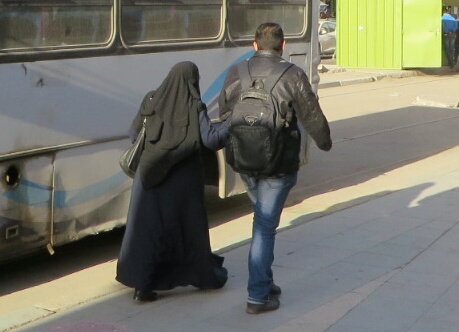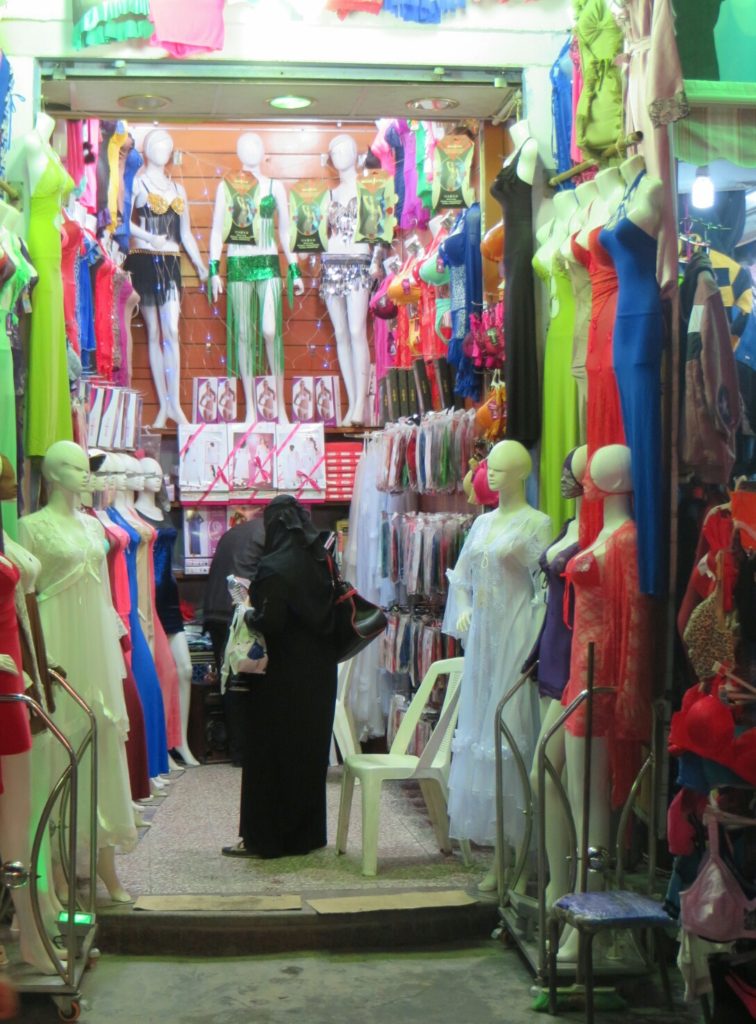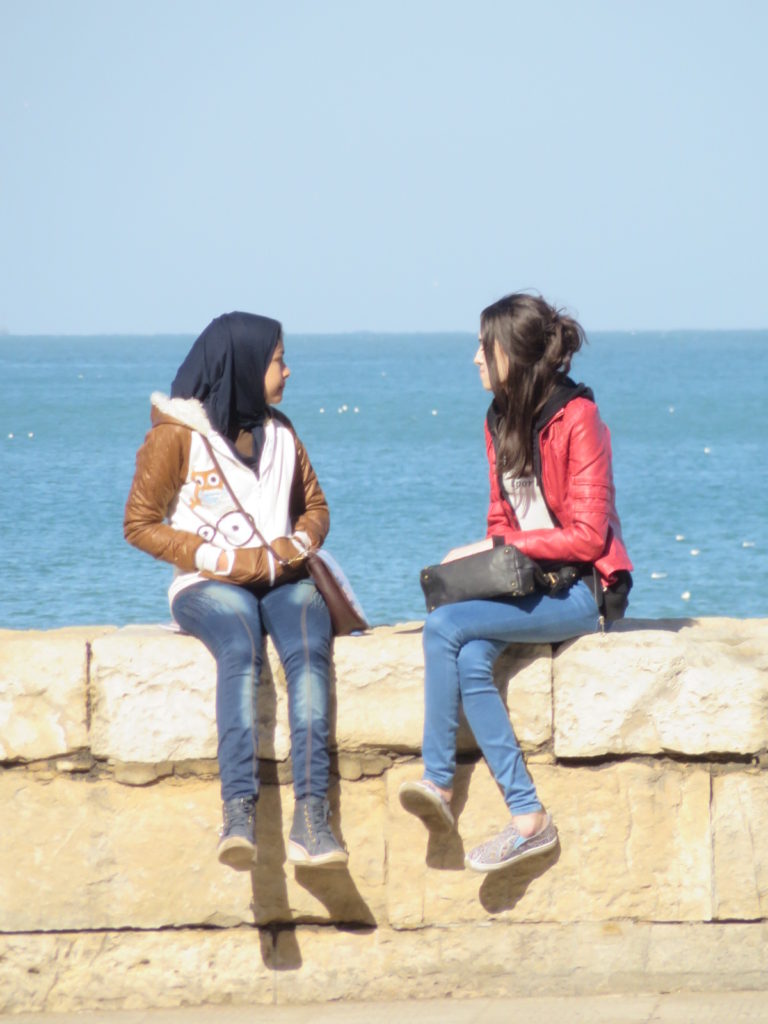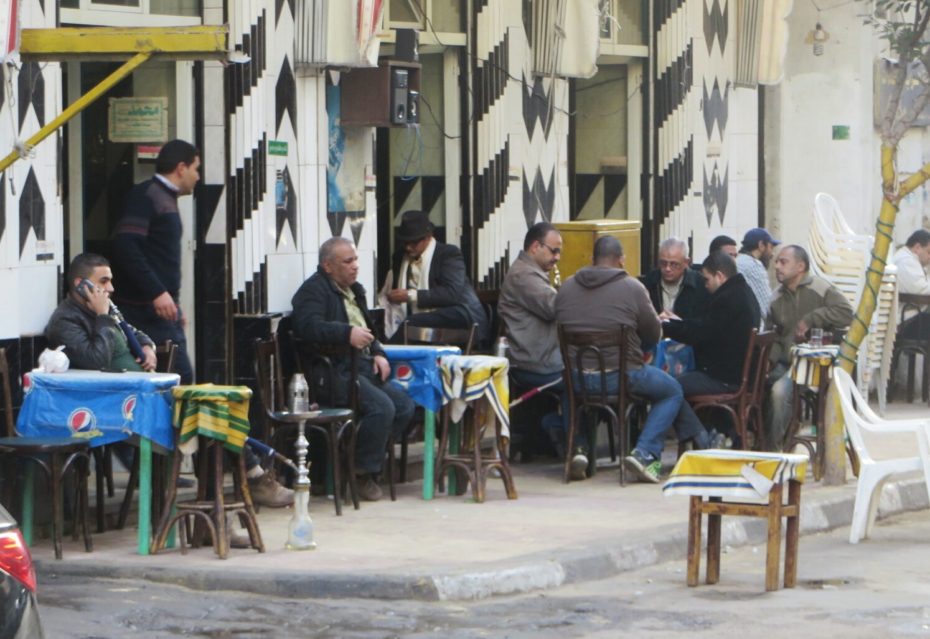Behind the veil of love lie dark secrets
Egyptians like to gossip. Also they like to complain about gossiping, as for some it extends to an unhealthy obsession in other people’s lives. To many in the West the subjects worthy of gossip may often seem rather tame but this is still a conservative society, despite many external appearances of western modernity and it’s only by digging deeper that you discover the tensions created at the front line of the clash between tradition and the influence of western values.
A young couple holding hands for an instant on a street corner does not raise even a whisper at home but here, if they are not married and are spotted by a nosy neighbour it could spell big trouble or at least a lot of awkward explanations. Many blocks of flats have a guardian, known as a Bowab, whose interests often extend beyond that of practical issues relating to the building but to overseeing public morality or at least a conduit for gossip, so it can be impossible to bring someone back, even to your own private apartment. But, things are changing: the gowaz saloonat (living room marriages), the highly formalised arranged marriage of the past where two families would meet in the living room to broker the deal of their choosing, is giving way to a process where many young people choose their own partner.

Definitely married!
The first barrier lovers have to overcome is that the western idea of dating is essentially off-limits, as any intimacy with an unmarried woman in public is a serious blow to her honour and virtue. Once the gossip machine slanders you as of loose morals you can become damaged goods in the eyes of prospective suitors and bring shame on your family. Of course, as with men the world over there is rarely any discussion of male virtue and putting it about a bit may only increase your status amongst other men, at least in private. Hence the best way of actually finding out if the one you fancy is the one you want to spend your life with is to get engaged. To a large degree this functions as a dating process, as the social cost of breaking off an engagement is relatively mild and could be explained away by numerous, socially acceptable mitigating factors rather than the fact you discovered that you detested your partner so much that you wanted to hack them to pieces with a machete. Even with an engagement it doesn’t give you freedom for a quick snog (kiss for non-UK readers) in the park, not even married couples get that privilege but it does mean you can be out together in public without creating any fuss. Without engagement, couples often make the first tentative steps among groups of friends, knowing full well the limitations on expressing undue interest. By western standards an engagement proposal can come after almost no interaction and parents may well be on hand to find you a suitable partner anyway, if you are not showing enough zeal in searching for one.
Next step usually requires parental approval, because without it a couple would face a serious uphill struggle. This is not simply due to a matter of social acceptability but practical and financial realities. The man needs to be able to fund a home for his future family, right down to the last spoon and napkin, no mean feat in the current economic climate. Hence parents are often holding the purse strings until the man has become sufficiently financially independent to keep his bride in the standards she and her parents would expect. All the time you are holding off on a decision to find the right girl there can be continual pressure to marry. This has led to a rise in the age of marriage with late 20’s and early 30’s not being uncommon among city folk.
One increasingly popular option to sidestep the process is the urfi or secret marriage. The ceremony is witnessed and semi-official so allows the couple to have sex but should the marriage fail the woman is in a potentially difficult position and may have trouble remarrying later. Needless to say keeping a marriage secret from your family presents enough problems in itself.
All this leaves society with a lot of mature, professional, virgin women living at home with their parents, often resenting the restrictions placed on their lives. That is not to say they are all clamouring for what we see as western freedoms to wear mini-skirts, kiss strange men and jump around like they are in a sanitary pad advert. Women tend to live comfortably within their Islamic faith and can see the benefits of strong family structures and having religious values, indeed it’s not unusual for daughters to feel a greater attachment to Islam than their mothers.

One of the great mysteries of Islam: why men sell sexy underwear to women
The importance of a bride’s virginity is still paramount, without it, many male suitors will express outrage at the brazen hussy, even if they’ve been out shagging anything they can get their hands on and rubbing their grubby paws over anything female. Perhaps unsurprisingly this creates its own problems and moral inconsistencies. The wonders of hymen reconstructive surgery offer a route out for women in need, whether it was by accident or design. Those unfortunates in need of an abortion face a ghastly selection of choices as it’s an almost entirely taboo subject. To preserve their chastity but still gain some bedroom action some women only indulge in anal sex, while the difficulty of mixing in public can even promote same-sex experimentation, as it can at least be carried out without risk of creating gossip. Is there any country where the imposition of moral values on sexuality doesn’t inevitably clash with base human urges at times?
Eclipsing all these issues is one big problem wrapped up in a very small word, men.
A society packed with sex starved young men, whose main motivation for the distant prospect of marriage is to get laid, is hardly conducive to smooth relationships. The most disturbing manifestation of this situation are the levels of sexual harassment which can only be described as epidemic: surveys of women reporting harassment are generally as near as dammit to 100% and around 95% of women report physical harassment. At least 50% of men even admit to it. Men trot out the same loathsome excuses that they do in our own countries, with over a third of harassers claiming that women actually wanted it and a half (or much more in some surveys) blaming it on provocative dress or makeup. On occasion, even other women can endorse the blame for harassment on women’s clothing. Beyond the odd pair of inadequately covered, tight jeans and not to suggest any lack of style on the part of the women, the typical form of clothing on the city streets of Egypt can best be described as about as provocative as a sofa, at least by more western standards. The alleged profession to Islamic values has done nothing to protect even the most conservatively dressed women from stray hands.

This is about as brazen as the clothing gets
On the subject of Islamic values it is important to point out that there is nothing in the tenets of faith that justifies this kind of behaviour and in fact having spoken to several women about the issue, all wished that the men would act as their faith demands, seeing the harassment as profoundly unislamic. At times however, simplistic, male centred interpretations of religious texts are not put in the wider theological context and end up being used to justify unpleasant and even violent behaviour. The subject needs to be seen in the context of the overall position of women in society, where Egypt is ranked 10th worse in the world.
Although numerous factors, such as economic uncertainty and poor education must play a role in this rise in harassment in recent years, it cannot be a coincidence that Egypt has shot to No.2 in the Internet Porn Search Terms chart, with Cairo being the world’s No.1 location. As in my home, the UK, the wide availability of porn has distorted notions of sexuality in many men and boys, only worsened by a penchant for violent and domineering forms that feed into the historic, patriarchal traditions in society. Indeed some surprising and disturbing porn search term trends crop up in some Muslim countries, “mother” and “mum” feature highly in Egypt, for which I dare not attempt to analyse. Arabic pornography is a growing business and the fame of stars such as Mia Khalifa has spread far beyond the region, though I am not personally familiar with her oeuvre.
There is simply a widespread acceptance of the behaviour with too many men oblivious to its harm. Despite a recent law criminalising harassment, it has proved virtually useless, as women have to drag the perpetrator to the police station, where many women report only further harassment from the officers. The shame is always loaded onto the woman and can lead to pressure from family and friends to drop the case, whilst the offender may suffer no such sanctions, even if convicted. Besides the total lack of effort to curb the institutionalised sexual violence within the police force, the government’s lack of good faith on women’s rights was further eroded by a law sanctioning temporary marriages, essentially to satisfy the lusts of rich Gulf State patrons at the expense of poorer women, whose families have been lured by the official payment of $6,380.

Men in their natural environment
If the revolution did lead to one thing though, it was the ability to at least have some discussion about harassment but other sexual topics are often so far out-of-bounds that the problems, although known, are consigned to the limbo of denial. Sex education in schools is almost non-existent for fear that it might promote licentiousness, ignoring the fact that ignorance breeds only greater sins, of which harassment is but one. The majority of women cite their husband as the main source of knowledge on sex and given that we know where the majority of men get their unrealistic ideas about the subject, it is hardly a surprise that the topic of the wedding night is an anxious debate for most women at some point in their lives. Also, despite progress in reducing the practice of female genital mutilation, (some may prefer the term cutting as it’s more sensitive to those subjected to it) such that it is illegal and not completely impossible to discuss, it may still be practiced on at least 70% of girls. Although unsanctioned by Islamic law, some religious figures still justify it and the ancient tradition runs deep. Few prosecutions of medical practitioners, professional or otherwise, are ever made and it is just as likely to be the women in the family who insist on it as anyone. One has to wonder why so many men are oblivious to something that can have such a drastic effect on a woman’s sexual experience, given that it would improve their own experience if their wife was getting more out of what should be a hugely pleasurable experience for both of them.
Of course these issues are hardly unknown in our own countries where sexual deviancies beyond the wildest imaginings of the average Egyptian are probably more common than many of us would suspect (believe me, I’ve seen a few of them), so it’s not as though we should be promoting our own models of morality upon others but without more openness and education it will mean that Egyptian women will continue to bear the brunt of male hypocrisy. Islamic and traditional Egyptian values have intermingled for centuries but both profess to uphold women’s honour and men only need to be true to this by letting women define that for themselves.





Another interesting post Graham (I particularly liked ‘provocative as a sofa’).
Thanks, just made a couple of additions that I forgot about on secret marriages (you might find the link worth reading) and fgm but sure you’ve read quite enough about that already – couldnt really ignore it as its so common here. I thought you said were going to Bangladesh?
I attended a very interesting lecture where a woman’s medical and human rights worker who engages communities said that a more helpful term is Female Genital Cutting, as many women dislike having their bodies described as being ‘mutilated.’ I can see their point, I don’t suppose I would like my body to called mutilated by strangers. These women have the right to describe themselves anyway they choose.
Well remembered about my position in Dhaka, but it has been called off due to Daesh (apparently) and warring politics parties…
There have been bombings, shootings, stabbings, hartals (strikes and transport stoppages), etc. over the years. I was still very keen to go but about a week before I was flying out an Italian man was shot dead a couple of metres down from the Australian Embassy in Dhaka and the next day a Japanese guy was gunned down too. Daesh claimed responsibility, but they’ll claim responsibility for anything that goes wrong in an Islamic country, so you only half believe them.
Expats in Bangladesh had been living with heightened security measures for nearly a year – could only travel to secure locations in a private car, no leaving your house unless necessary, the embassies and country clubs won’t allow non-nationals to enter, the list goes on. Then the people responsible for the safety of Australians living overseas did more security assessments, taking the pulse of the nation, and decided that Bangladesh isn’t going to become more secure any time soon. Most of Australian aid was evac’d out by 31 Dec 2015.
Not very sure where I’m going next. It’s all been quite demoralising.
Good point re cutting, I am familiar with the term but it didnt come to mind as once I’d pressed publish I realised I had forgotten to mention the subject so hurriedly corrected it without thinking about anything else I should say – will stick in a note. FGM still seems to be the most widely used term and I guess it will be for a while yet anyway. I had pretty much guessed that the situation in Bangladesh was the reason why you hadn’t gone. Alas with the increasingly dictatorial govt I dont see much hope for things improving as they are more intent on blaming the opposition for everything than actually doing anything positive. The way they handled the civil war crimes cases in recent years was almost certainly a big factor in the current terrorism.
Hope you are not getting too despondent but wherever they send you I am looking forward to your insight. Your well observed glimpses into the culture are sadly lacking in the travel blogging world – keep up the great work
Chapeau ..
really liked it ^_^
Thank Dina or I should say merci beaucoup
Pingback: Aktuelle links zum Leben in Kairo heute | akihart